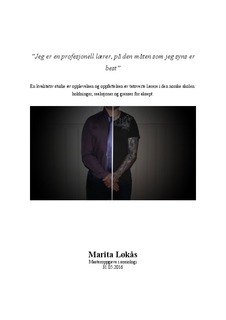| dc.description.abstract | This master thesis investigates how tattoos can affect teachers’ professional appearance in the Norwegian school. How are tattoos perceived in encounters with other teachers, principals, pupils and parents, as well as how does the tattooed teacher reflect around the probability that their position as a role model can be challenged because of their tattoos. Through this study I also reflect around what the position of tattoos is in todays society, what it symbolizes to be visibly tattooed and what boundaries the tattooed must relate to. The aim is to understand the limits of acceptance in the context of the expectations to the teacher role, and thereby create an awareness of how being tattooed can affect the individuals professional role in the workplace. A focus that has not been researched to such an extent in other papers and books. The main questions in this paper is: 1) How is being a tattooed teacher perceived in the face of their own and others expectations of the teacher role, and what consequences do the tattoos have for their professional role? 2) What significance does the teachers base their tattoos on and which elements do they emphasize as important? 3) Which differences have the teachers experienced in gender expectations with regard to the use and attitudes towards being tattooed?
In this paper I have used qualitative depth- and group interviews with tattooed teachers and non-tattooed principals. By interviewing both teachers and principals I was able to compare the teachers’ understandings with the principals, and I was also able to identify the attitudes of authorities, given their position as the norm setters in the institution. My theoretical inspiration in this paper is based on micro sociology, and especially the interactional perspective.
The findings show that there are some normative boundary issues in terms of what is considered acceptable in the face of the teacher role, which also means tattoos can have an impact on whether one emerges as professional or not. The problems associated with the teacher role is that the established expectations of what the teacher role involves relate to individuals subjective interpretations. Specifically, the analysis shows that the tattooed boundaries mainly includes design-related limits and location/visibility of tattoos, but it can also be influenced by the tattoo quantity and size. Teachers internalises the expectations to the teacher role and professional identity as a part of their personal identity. Although informants believe that they haven’t taken their occupational position in account in the choice of tattoos. I will argue that they have done it, but then more unconsciously. Tattoos that have negative connotations aren’t interesting for the teachers, because it challenges not only their professional identity, but also a part of their personal identity. Furthermore, my findings suggest that the difference in gender expectations also results in that the tattooed women and men probably have to negotiate professionalism differently, because of varying expectations | nb_NO |
